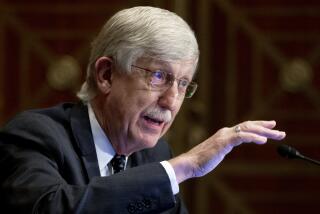‘Disease Knows No Politics,’ Health Institute Nominee Says
WASHINGTON — Elias Zerhouni, President Bush’s nominee to head the National Institutes of Health, sped through a largely amiable confirmation hearing Tuesday, pledging to abide by the president’s restrictions on stem cell research policy but affirming the role of NIH director as a dispassionate scientific advisor.
“Disease knows no politics,” Zerhouni told the Senate Health, Education, Labor and Pensions Committee. “I believe the NIH and its director should not be or made to be factional but must always remain factual.”
Zerhouni, head of Johns Hopkins University Hospital’s radiology department, appeared likely to receive overwhelming support when the committee votes today to send his nomination to the Senate floor. Committee Chairman Edward M. Kennedy (D-Mass.) predicted the full Senate would confirm Zerhouni as early as this week.
If confirmed, Zerhouni, 51, would fill a job that has been vacant since Dr. Harold Varmus stepped down more than two years ago.
His expected confirmation comes at the end of a period of unprecedented growth at the agency, the director of which helps set the national medical research agenda and manages a nearly $30-billion budget that embraces more than two dozen institutes. The NIH’s budget has nearly doubled over the last five years.
An immigrant who came to this country from Algiers with a few hundred dollars and little command of English, Zerhouni was held up by several senators as an example of the American dream. He was accompanied to the hearing by his wife and three children, his mother and a childhood friend from Algeria.
Zerhouni faced mild questioning on some of the biggest issues facing scientists, including the ethics of cutting-edge research, the need to protect people participating in scientific trials and the lack of diversity in many science-based fields.
At Johns Hopkins, Zerhouni played a crucial role in creating the university’s Institute for Cell Technology. That led to speculation that his view of stem cell research was probably more expansive than President Bush’s.
“I was instrumental in creating an institute for stem cell engineering primarily because I was concerned about the lack of any federal funding to advance fundamental research still needed in this new and fledgling field,” he said Tuesday.
But, he added, he believed that “in the current state of science,” Bush’s decision last August to use federal funds for research limited to existing embryonic stem cell lines was “an important advance.” Zerhouni said that before that, he had spoken to many scientists reluctant to pursue stem cell research because of the great burden of trying to raise money solely from private sources.
“Without federal funds,” he said, “it is hard for me to see how you develop a field of science in this country.”
Zerhouni said he believed the existing stem cell lines would be sufficient to conduct basic research, and he ducked questions about what he would do if they were not.
Pressed by Sen. Paul Wellstone (D-Minn.) about whether he would advocate expanding available lines if research showed promise in treating debilitating diseases such as Parkinson’s and Alzheimer’s, Zerhouni said: “Once those pathways become clear, I will be the first one to assess that information” and provide it to others.
“I’m not sure if that was a yes or a no,” Wellstone said. “I don’t think it was quite what I was hoping to hear, but I’ll follow up with you later.”
In the only contentious moment of the 90-minute hearing, Sen. Barbara A. Mikulski (D-Md.) bristled when Zerhouni seemed to dodge a question she asked about how he would recruit and retain scientists, as well as attract more minorities and women to the field.
“There are no easy answers,” Zerhouni said.
More to Read
Sign up for Essential California
The most important California stories and recommendations in your inbox every morning.
You may occasionally receive promotional content from the Los Angeles Times.











